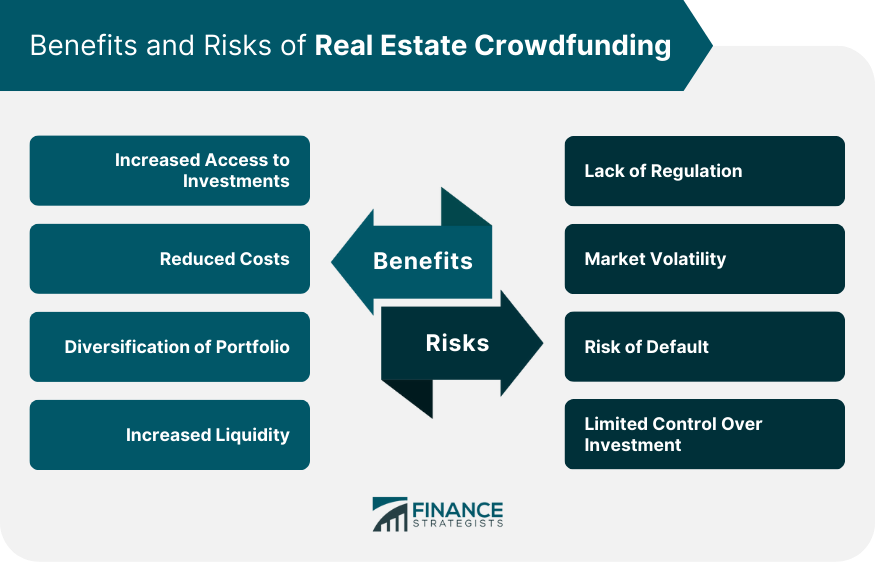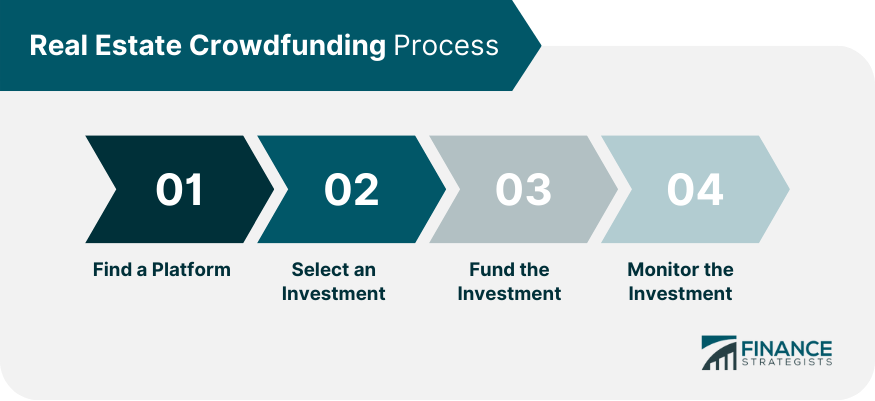Real estate crowdfunding involves the use of online platforms to raise funds from a large number of investors to finance real estate projects. Investors can participate in these projects with smaller amounts of capital than would be required for traditional real estate investing. Real estate crowdfunding has emerged as a popular alternative to traditional real estate investing, offering investors a new way to access real estate investments and providing developers with new sources of funding. There are two main types of real estate crowdfunding: equity-based and debt-based. Equity-based crowdfunding allows investors to purchase ownership stakes in real estate projects. This means that investors have a share in the profits generated by the property or a return on their investment when the property is sold. Typically, equity crowdfunding investments require a longer time horizon and carry a higher level of risk than debt-based investments. However, they also offer the potential for higher returns. Equity-based crowdfunding is often used for larger, more complex projects, such as commercial or multi-family properties. Investors can invest in a variety of real estate projects with relatively low minimum investments, making it accessible to a wider range of investors. However, investors should carefully evaluate the investment opportunity and the sponsor's track record before investing in equity-based crowdfunding. Debt-based crowdfunding, on the other hand, involves investors providing loans to real estate developers to finance their projects. In exchange for their investment, investors receive interest payments on their loans. Unlike equity-based crowdfunding, debt-based crowdfunding does not provide investors with ownership stakes in the property. However, it is generally considered to be a lower-risk investment option. Debt-based crowdfunding is often used for smaller, single-family residential properties. It is generally more accessible to investors than equity-based crowdfunding, as it typically requires lower minimum investments. However, investors should still carefully evaluate the investment opportunity and the sponsor's track record before investing in debt-based crowdfunding. They should also be aware of the risks associated with lending money to real estate developers, such as the risk of default or bankruptcy. Real estate crowdfunding platforms have reduced the barriers to entry for real estate investment, making it accessible to a wider pool of investors. By pooling small amounts of capital from multiple investors, real estate projects can be funded that would otherwise be unattainable for individual investors. Traditional real estate investment funds typically charge high fees and require large investment amounts, making it difficult for smaller investors to participate. In contrast, real estate crowdfunding platforms charge lower fees and offer lower investment minimums, enabling investors to access real estate investment opportunities with smaller amounts of capital. Real estate crowdfunding allows investors to diversify their portfolios by investing in different types of real estate projects across different geographic locations. This can help reduce risk and improve returns. Real estate crowdfunding provides investors with increased liquidity as investments can be bought and sold more easily compared to traditional real estate investments. Many real estate crowdfunding platforms also offer secondary markets where investors can sell their investments before the end of the investment term. Real estate crowdfunding is a relatively new industry and is not as heavily regulated as traditional real estate investments. This lack of oversight increases the risk of fraudulent activities, such as misappropriation of funds or false representations of investment opportunities. Investors must perform due diligence and research the platforms and developers they are investing with to minimize these risks. Real estate crowdfunding investments are still subject to market forces and may be impacted by changes in the broader economy, interest rates, or changes in consumer behavior. Fluctuations in property values and occupancy rates can also impact the performance of real estate crowdfunding investments. Real estate crowdfunding investments carry the risk of default if the developer is unable to repay the loan or generate sufficient returns to pay investors. Investors must assess the creditworthiness of the developer and the viability of the project to minimize this risk. Real estate crowdfunding investors have limited control over their investments, with decisions related to the project left up to the developer. While investors may have some input into the project's development or management, they typically have little control over the day-to-day operations of the project. It's important to research the developer's track record and experience to minimize this risk. To find the right real estate crowdfunding platform, investors should research and compare platforms based on their investment options, fees, and other features. Investors should look for platforms that align with their investment goals and provide strong due diligence and a transparent investment process. Once investors have found a platform, they should carefully evaluate investment opportunities based on the risk, potential return, and other factors. Investors should review the developer's track record, the project's location and market demand, and any legal or regulatory issues. Funding real estate crowdfunding investments is typically done online using a variety of payment methods, including bank transfers, credit cards, and online payment platforms. Investors should ensure that their funds are transferred securely and that they have a record of the transaction. Monitoring real estate crowdfunding investments is crucial for staying informed about the progress of the project and identifying any potential risks or challenges. Investors should review regular updates from the developer, including financial statements, construction progress, and any unexpected delays or setbacks. Real estate crowdfunding is an innovative way to invest in real estate projects that offers investors several benefits, including increased access to investments, reduced costs, diversification of portfolio, and increased liquidity. However, there are also risks associated with real estate crowdfunding, such as lack of regulation, market volatility, risk of default, and limited control over investment. Investors must perform due diligence and carefully research the platform and the developer before investing. With the proper research and risk management, real estate crowdfunding can be a viable investment strategy for those looking to diversify their portfolios and access real estate investment opportunities with smaller amounts of capital.What Is Real Estate Crowdfunding?
Types of Real Estate Crowdfunding
Equity-Based Crowdfunding
Debt-Based Crowdfunding
Benefits of Real Estate Crowdfunding
Increased Access to Investments
Reduced Costs
Diversification of Portfolio
Increased Liquidity
Risks of Real Estate Crowdfunding
Lack of Regulation
Market Volatility
Risk of Default
Limited Control Over Investment

Real Estate Crowdfunding Process
Find a Platform
Select an Investment
Fund the Investment
Monitor the Investment

Bottom Line
Real Estate Crowdfunding FAQs
Real estate crowdfunding is a way of investing in property by pooling funds with other investors via an online platform.
Real estate crowdfunding offers increased access to investments, reduced costs, diversification of portfolio, and increased liquidity.
Real estate crowdfunding risks include lack of regulation, market volatility, risk of default, and limited control over investment.
Real estate crowdfunding involves finding a platform, selecting an investment, funding the investment, and monitoring the investment.
Choose a platform that aligns with your investment goals, offers strong due diligence, and provides a clear investment process and transparent fees.
True Tamplin is a published author, public speaker, CEO of UpDigital, and founder of Finance Strategists.
True is a Certified Educator in Personal Finance (CEPF®), author of The Handy Financial Ratios Guide, a member of the Society for Advancing Business Editing and Writing, contributes to his financial education site, Finance Strategists, and has spoken to various financial communities such as the CFA Institute, as well as university students like his Alma mater, Biola University, where he received a bachelor of science in business and data analytics.
To learn more about True, visit his personal website or view his author profiles on Amazon, Nasdaq and Forbes.













